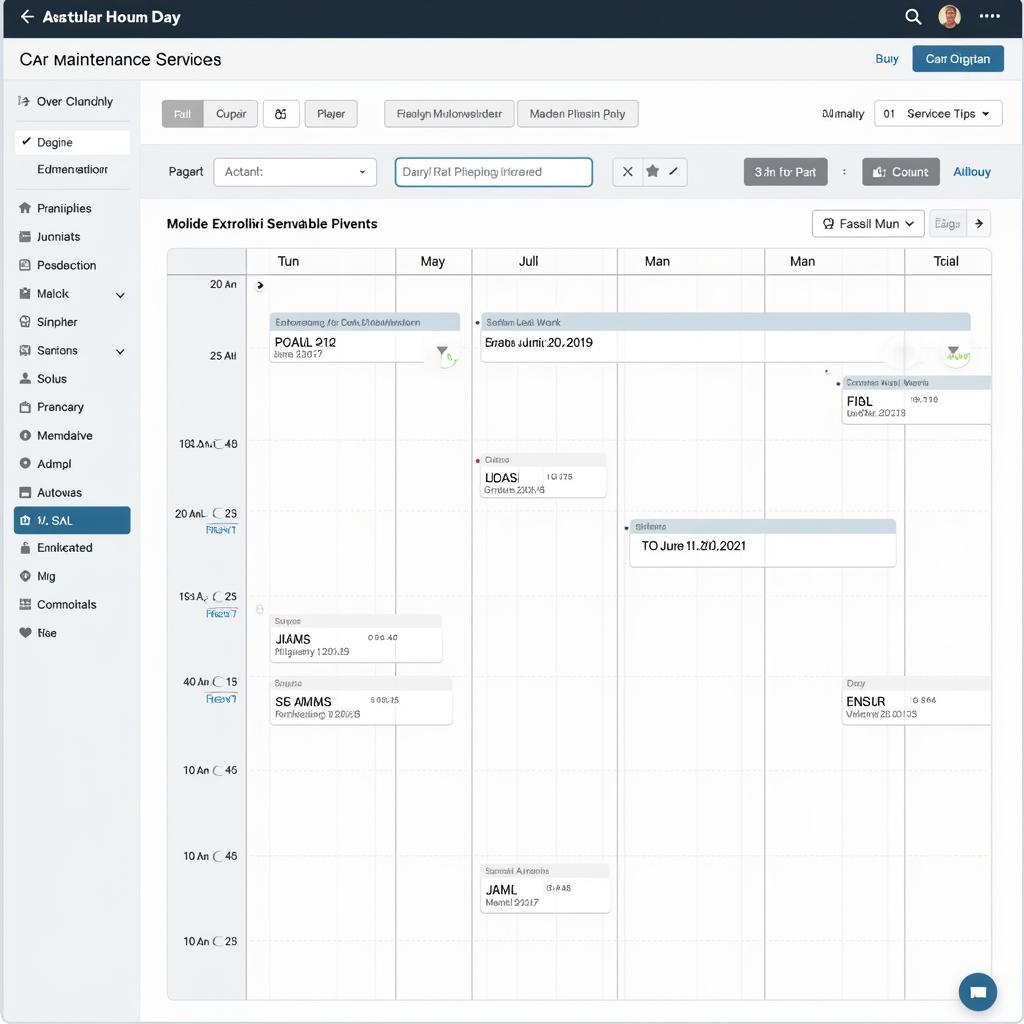When it comes to keeping your car running smoothly, the age-old question arises: should you base your maintenance schedule on months or mileage? The answer, as with many things in life, is not so simple. Both time and distance play crucial roles in your car’s wear and tear, and finding the right balance between the two is key to optimal vehicle health.
 Car Maintenance Schedule Calendar
Car Maintenance Schedule Calendar
While your owner’s manual provides a recommended maintenance schedule based on both months and mileage, understanding the reasoning behind these recommendations can empower you to make informed decisions about your car’s upkeep. Let’s delve into the factors at play and explore how to strike the right balance for your vehicle.
The Case for Mileage-Based Maintenance
The more you drive, the more wear and tear your car experiences. This is the core principle behind mileage-based maintenance. Components like your engine, transmission, brakes, and tires endure stress with every mile driven.
- Engine Oil: Engine oil degrades over time and loses its ability to lubricate engine components effectively. Frequent driving means more frequent oil changes are necessary.
- Tires: Tire tread wears down with use, reducing traction and increasing the risk of flats.
- Brakes: Brake pads and rotors wear down with every stop, and frequent driving necessitates more frequent inspections and replacements.
For those who frequently embark on long road trips or have a long daily commute, adhering to mileage-based maintenance intervals is crucial.
The Case for Time-Based Maintenance
Even if your car spends most of its time parked, the passage of time still takes its toll. Fluids can break down, rubber components can dry out and crack, and batteries can lose their charge. Time-based maintenance addresses these issues.
- Fluids: Coolant, brake fluid, and transmission fluid degrade over time, even without frequent use. Regular flushing and replacement prevent corrosion and maintain optimal performance.
- Rubber Components: Belts, hoses, and seals can become brittle and crack over time, leading to leaks and potential component damage.
- Battery: Car batteries naturally lose charge over time, and infrequent driving can accelerate this process. Regular checks and replacements ensure reliable starting.
If you own a classic car, a vehicle used for short trips, or one that sits idle for extended periods, adhering to time-based maintenance is paramount.
Striking the Right Balance
So, how do you decide which factor to prioritize? The key is to consider your driving habits and environment.
- High-Mileage Drivers: If you frequently drive long distances, prioritize mileage-based maintenance while also keeping an eye on time-based recommendations.
- Low-Mileage Drivers: If your car sees limited use, prioritize time-based maintenance while also monitoring mileage intervals.
- Extreme Conditions: Extreme temperatures, humidity, and dusty environments can accelerate wear and tear. Consult your owner’s manual for adjusted maintenance schedules in such cases.
The Importance of Routine Inspections
Regardless of your driving habits, routine inspections by a qualified mechanic are invaluable. They can identify potential problems early on, saving you from costly repairs down the road. Consider scheduling a comprehensive vehicle inspection at least once a year, or more frequently if you frequently drive in demanding conditions.
Don’t Ignore Warning Signs
While following a maintenance schedule is essential, it’s equally important to pay attention to your car. Unusual noises, warning lights on your dashboard, or changes in your car’s handling could indicate an issue that requires immediate attention.
what are some maintenance services of car
Conclusion
Ultimately, both months and mileage are important factors in car maintenance. Finding the right balance for your vehicle depends on your driving habits, environment, and the specific recommendations outlined in your owner’s manual. By adhering to a well-rounded maintenance schedule and remaining vigilant about your car’s health, you can enjoy many miles of trouble-free driving.
Need help creating a tailored maintenance schedule for your car? Contact AutoTipPro today at +1 (641) 206-8880 or visit our office at 500 N St Mary’s St, San Antonio, TX 78205, United States. Our team of automotive experts is here to provide personalized guidance and support to keep your car running its best.







Leave a Reply